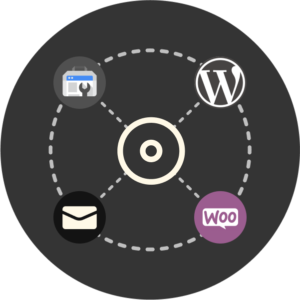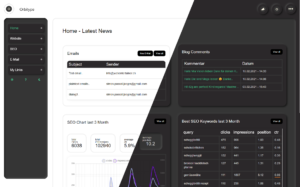Measuring the success of my website

Measuring the success of my website
How do you measure the success of your own website? There are many different metrics that you should consider. You can focus on clicks and visitors to the website. However, what ultimately says more are the effective purchases or contact inquiries that are generated via the website. Often, however, not even these are decisive, because people like to inform themselves on websites, but then come to the store or call by phone.
As you can see, it is quite difficult to determine by what you can really measure the success of a website. A website that is seen by x thousand people, but does not bring you a single franc, brings you very little for your sales goals. In such a case, you would have to monetize the website intelligently.
In general, I would say that the success of a website can be determined by four main factors. All four factors together should show your success.
Direct website hits and referrals
The first metric you can look at to see if something is happening on your website is the basic data from your Google Analytics account. There you will find metrics about how many people visited (at what time and on which subpages) and how long they stayed. It is important that (without the appropriate filters) all website visits (including your own) are recorded there. In general, we use Google Analytics to get an idea of which content is well received by visitors. This in turn can be measured by the length of stay and the frequency of access to the respective subpages.
Website visitors via Google
To find out how many people are finding your website via Google, we use Google Search Console. We always fixate very strongly on Google, because Google has the largest market share in Switzerland. However, this tool is also available for the Bing search engine. These tools document exactly when and how many people came to your website via Google or Bing search. It is important to note that the Google Search Console does not document direct website accesses, but only those that were generated via Google Search.
In the Google Search Console you can also find the exact keywords that people entered into Google Search while they were looking for content on your topic. You can then use these keywords to optimize your blog posts afterwards. Google loves post optimization and will reward you with better rankings. Speaking of rankings, you can also find them in the Google Search Console. If you want to combine this data from Search Console with the data from Google Analytics, you can do that in the Google Analytics settings without any problems.
Purchases or contact requests
One of the most important metrics for your website’s success is, of course, contact inquiries or product/service sales through your website. It’s hard to believe, but it’s easy to get lost in the shuffle of all these metrics and lose focus on what’s important. Especially with online advertising, this is often the case. Many turn off their Facebook ads as soon as they have a higher cost-per-click (CPC) than two edges. Of course, in some cases it is correct to stop, but in most cases these advertisers forget that the product they are selling is making them money, and they need to include a certain amount of money for advertising.
Feedback from customers
The last point to measure the success of your website is the quality feedbacks from your customers. Ask your customers how they find your website. One way would be to put a small form on the website or ask your customers about it in your store. Quality feedback from real people is still one of the best sources of information when it comes to improving your web content. Finally, don’t forget that your website should appeal to people. They are normal, real people. Treat them as such. If you need help building a website that will support you and help you generate new contacts over the Internet, feel free to check out our offer.
A website is a tool. You can do great things with the right tool!
What problems does the email module solve?
Just by having an email client in Orbitype, various common workflows in the areas of customer acquisition support as well as administration and organization in connection with the company website will be drastically simplified. Continue to use and improve email as an established communication medium so that it can be used with the same convenience…
Read MoreE-Mail Module for SEO outreach and WooCommerce workflows
What problems does the WordPress module solve? Simpler, reduced, unified backend UX for new and existing website which generates a…
Read MoreWordPress Setup and Wp-Admin Alternatives
The private end user benefits from an external admin panel, as complexity is taken out of recurring workflows, thus causing fewer errors. The faster and easier editing, as well as the combination of useful third-party tools in the admin panel, allow for a more efficient management of the website. Due to the fact that third-party…
Read MoreSeo & Workflow focused WordPress Admin alternative Orbitype
The WordPress admin area is great for creating a website. Many plugins are installed to the creation are unavoidable. This becomes a problem as soon as the creation of the website is finished. Too many plugins have pop-ups and makes the whole user interface (WP-ADMIN) very confusing for everyday adjustments. Orbitype provides a pleasant working…
Read MoreUser journey of your potential customers
What is a user experience? User experience starts well before the first visit to your website. The user experience is…
Read MorePlans & pricing
Stay cool, we have a 48-hour money back guarantee!






